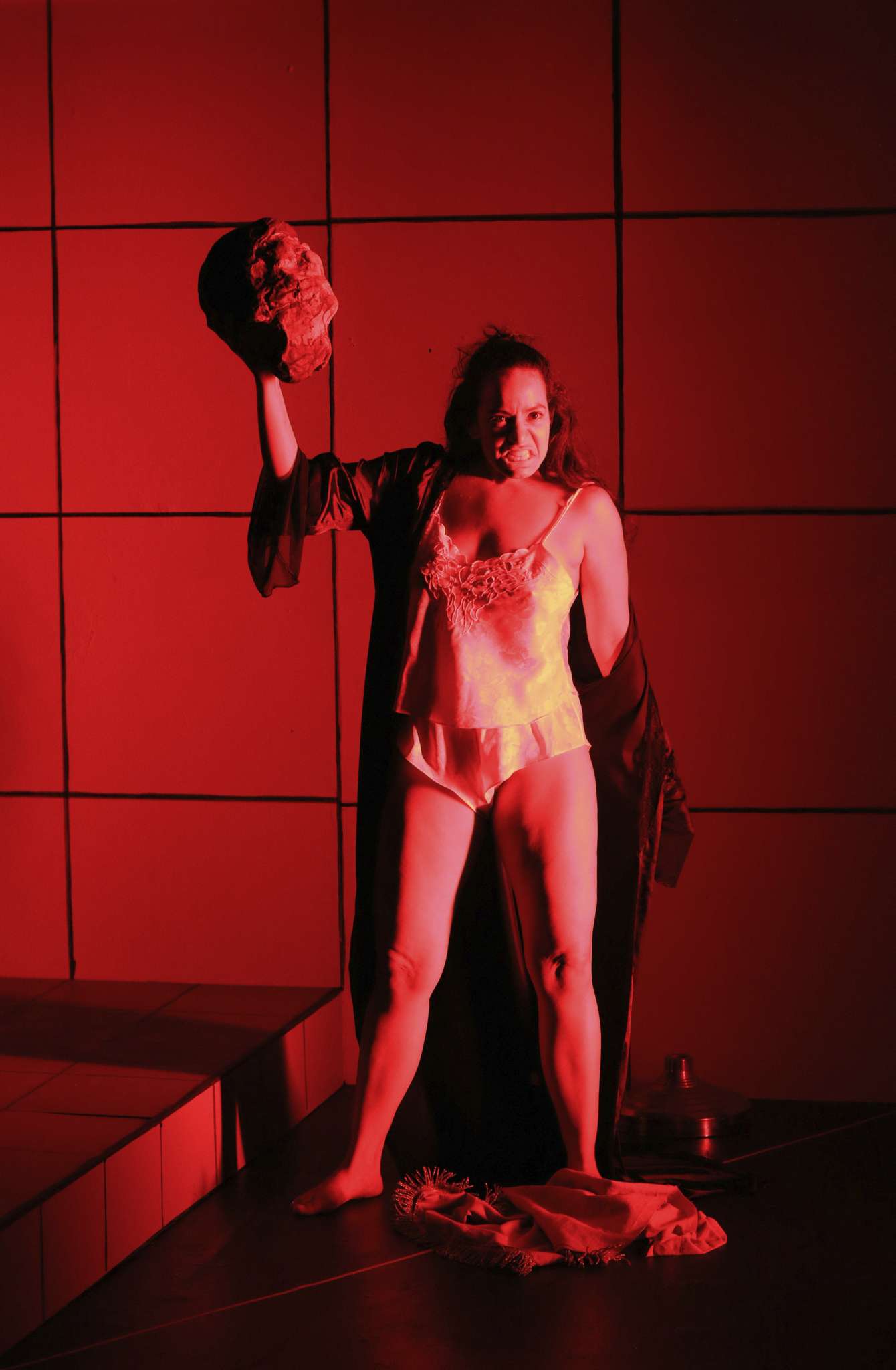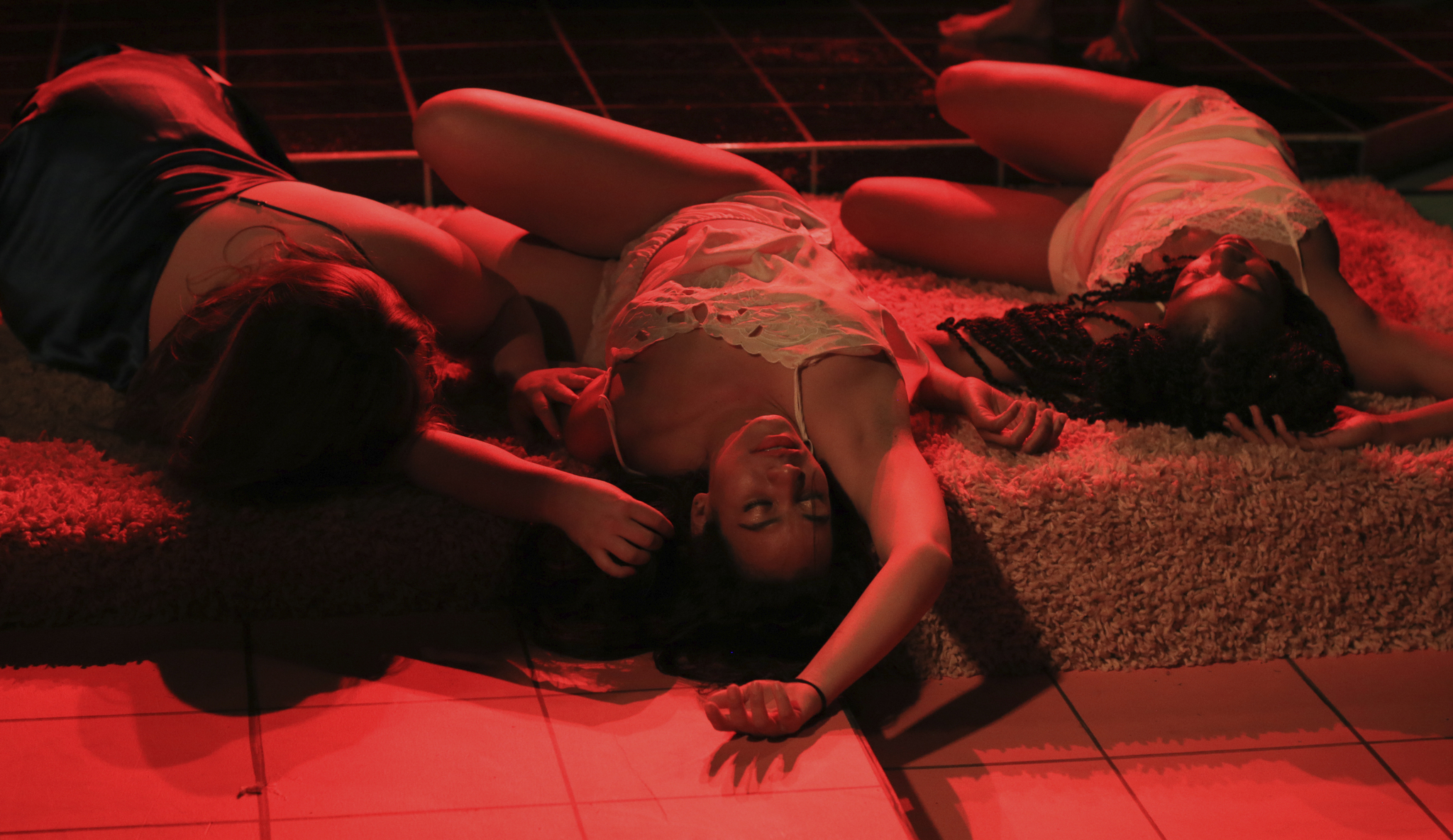Review of Cock, Yale Cabaret
The first thing you probably notice is that the stage set (by Lily Guerin) is a giant cage with four openings, one on each side, and with little seats attached to each corner. The next thing you probably notice is that the Yale Cabaret has new tables for the audience. Instead of round, they are long and rectangular, like the kind you might sit at to pass judgment. The audience is surrounding an arena where some kind of contest may take place. A cockfight, perhaps?
Cock by British playwright Mike Bartlett, directed by second-year director Alex Keegan, and proposed by John Evans Reese, who plays the only named character, John (the others are M, Daniel Liu; W, Zoe Mann; F, Thomas Pang, for Man, Woman, Father), sort of assumes that when you read or hear “cock,” you don’t automatically think of the two-legged, feathered creature. And that’s germane, certainly. But it’s also the case that a phrase like “the cock of the walk”—describing someone who struts around like he owns the place—may be implied. John is “the cock” here and as such he’s the prize to be fought over by his two lovers—M and W. The gist of it is that they discover this cock is something of a dick.
If that were all, that might be enough, but Bartlett seems to have a bit more on his mind, turning up the heat on the awkward dinner party trope and letting his characters get a bit unhinged, verbally, if not physically. The driving idea is sexual ambiguity as instanced when a member of a long-standing couple leaves that couple and opts for a lover that is not the same gender as the former lover. It may be that the locus classicus is a man, married to a woman, who, having already done the family bit, takes up with a man. Here, it’s the flip of that: John is with M; they seem to have hit a snag and John calls it quits, insisting that they are “fundamentally different” in how they approach life. While on his way to work one day, John is approached by W. They’ve noticed each other but haven’t spoken. Dancing and flirting ensues and, for the first time in his life, John confronts the question of whether he could have sex with a woman.
The play, which has been funny in showing us the sparring and at times passionate locutions of John and M—extremely well played by Reese and Lui—gets funnier when it becomes a question of John’s exploration of the—to him—unprecedented organ known by that other “c” word. Zoe Mann is wonderful as a woman being explored “like a science project” while also getting aroused. And John’s cock gets to do its cock of the walk bit as well, thus demonstrating that, for him, arousal isn’t only for gents with gents.
The dickness of John comes in his leaving W in the lurch and going back to M, then being unable to call it off with either M or W. A fact which appalls both of his lovers, since neither is inclined to accept that he might be bi and simply need a little of each (I say “each” because the play only gives him two choices). John vacillates at such a pitch that one might wonder why either M or W stays in the game. Even John wonders and the best he can determine is that it’s because of his eyes.
About that awkward dinner party. It’s offered by M (who does the cooking) as a way to let W down, and is put to W, by John, as an opportunity for a united front to end the thing with M. F, who is M’s dad and who has been invited by M as “backup,” adds to the tension with an aria about how he came to accept M with John as a genetic matter having to do with chemicals in the brain. The chemicals in his own brain seem to cause him to treat W as a manipulator and to look too often at her breasts—in W’s opinion. The outing going on at this point—of masculinist, sexist, “gay” and “straight” assumptions and prejudices—comes thick and fast. It’s mostly fun because, however you feel about these things, someone is bound to say something you’d argue with, were you in that cage.
John at one point disputes old-fashioned usages like “gay” and “straight” as though he’s about to manage a proclamation of sexual freedom. But it never quite comes to that. In fact, it ends up rather badly for John, more or less fetal while M stops just short of singing “who’s afraid of Virginia Woolf?”
Bartlett was born in 1980, and the Eighties is when sex became “an identity,” for political purposes, and a genetic predisposition, for normative purposes, and that’s the legacy that Cock wants to engage, to question why either/or is the only thing that makes sense, sexually. As a playwright, he’s of the type for whom a stance—and a nimble tongue—is enough to merit the name “character,” so we don’t ever have to delve into why W thinks being a gay man’s first girl is “the one” for her (though I imagine she’s not alone in that), nor into why John needs M to keep him in thrall or why M needs his whipping boy.
The actors are all wonderful, and the energy crackles. The pacing is rapid-fire, and the interrelations are all vividly realized. The interaction between Liu and Reese is a driving force in the play because so much derives from an implied situation that precedes the initial break. Caustic and lambent, Liu’s M generally pushes John’s buttons in a way that must work for both. And Reese and Mann make John with W seem equally viable, not just as an escape valve, but as a way to be a different person. As the father, Pang sounds sufficiently of a different generation as to be out of place but also—in his view—the voice of normality. Finally, Reese, in Stephanie Bahniuk’s costume and hair, has a certain look and plays so convincingly the charismatic man-child that we can believe he’s the cherished fetish M and W take him for.
In the end Cock made me stand—to applaud.
Cock
By Mike Bartlett
Directed by Alex Keegan
Artistic Consultant: Yura Kordonsky; Set Designer: Lily Guerin; Costume Designer: Stephanie Bahniuk; Lighting Designer: Evan C. Anderson; Sound Designer: Bailey Trierweiler; Co-Dramaturgs: Margaret E. Douglas & Sophie Greenspan; Co-Technical Directors: Yaro Yarashevich & Andrew Reidermann; Producer: Caitlin Volz; Stage Manager: Fabiola Syvel
Cast: Daniel Liu, Zoe Mann, Thomas Pang, John Evans Reese
Yale Cabaret
February 27-29, 2020





